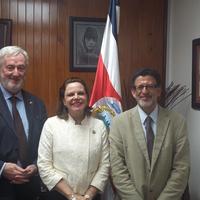The Institute’s Collen Research Programme in Sub-Saharan Africa[1] has recently been extended into Latin America thanks to additional funding from the European Foundation Life Sciences research Partners in order to evaluate the Healthy Youth Programme of the Fundacion Tejedores de Suenos in Costa Rica[2]. This is a programme for young people, which aims to raise awareness among the population – and specifically among teenagers – about the disadvantages related to teenage pregnancy, and to encourage and enable vulnerable young people to stay in education until they are 18 years old – even if they should have a baby.
I visited Costa Rica at the beginning of this month (August 2017) to carry out fieldwork for the evaluation, meeting key players in policy and practice and learning of the almost superhuman efforts in difficult conditions to improve the day-to-day quality of life of young people, hoping thereby to encourage them to remain in school and not drop out into crime, drugs and prostitution.
One of the key political players, whom I met during my visit, was the Vice President of Costa Rica, Ana Helena Chacon, a passionate campaigner for women’s rights and clearly extremely concerned about teenage pregnancies in the country.
And the challenges of teenage (and even younger) pregnancy in this small, green, peaceful country are challenges indeed by any stretch of the imagination. Some recent data reveal that in 2008, 15 girls under the age of 12 had babies. One year later, the number had declined to just 8, but among girls aged 12-14 years, the number having babies seemed to remain pretty constant at just under 700. This number increases 10-fold for the 15-17 year old girls – around 7000 babies[3].
United Nations data[4] suggest that in Costa Rica the age-specific birth rate for young women aged 15-19 years in 2010-15 was 59.1, which compares with a rate of just 17.7 for the same group in the United Kingdom. The total fertility rate[5], however, is almost the same in the two countries, standing at 1.85 in Costa Rica and 1.88 in the United Kingdom in 2010-15.
While these numbers alone raise their own concerns among policy makers and practitioners, there is a hidden concern behind the statistics. It is one of illicit sexual violence and exploitation that needs to be investigated. And as highlighted by Vice President Chanon, it is all too often within the family. Thanks to politicians like the Vice President, Costa Rica has legislative, organizational, public policy, and programme-based platforms to address teenage pregnancy and maternity, and educational programmes are highly prioritised.
But proactive policy and programmes take time to push through and impact on attitudes and behaviours, something we are quite familiar with in the United Kingdom too, so while these initiatives are welcome, community-based projects in Costa Rica are attempting to tackle the immediate challenges facing young people and their families. And the Healthy Youth programme is part of this nationwide movement in the country, supporting both individual young people and providing a platform for community-based projects working in the field.
During my evaluation fieldwork, I was able to visit the leaders of four community based projects working with vulnerable young people in and around San Jose, the capital of Costa Rica. Interestingly, three of the four projects used sport to engage young people, while the fourth project was quite simply a response to visible need on the streets. Each of the projects is led by driven, passionate people – passionate about their communities and passionate about the futures of young people in their communities.
There is Ivan Villegas Franco, who started the project Raquetball Integral in Hatillo. Iva, himself a former member of the Colombian and Costa Rican national racquetball teams, has witnessed the power of sport and education.
There is Sonia Montero Briceno, who has a black belt in Taekwondo and runs the Academia Taekwondo Koryo, also in Hatillo.
There is Jorge Villalobos, another black belt and former Chair of the Selection Committee for the National Taekwondo Championships in his community. Jorge runs the School of Taekwondo Il Chul in Tres Rios.
And finally, there is Veronica Castro, a modest but driven young woman, who with her mother set up Fundación Brisas de Esperanza DLDP, a project run from their own home in Tres Rios and designed simply to take young children and teenagers off the street (when not in school) and engage them in various activities – but one of their primary functions is simply providing meals and support and protection for these youngsters.
The story of their work and their success is both humbling and inspiring.
It is the rainy season in Costa Rica, as I write this blog, and the rain comes round almost daily, regular as clockwork, causing the dry lands to bloom into lush green vegetation.
The power of these rains and the transformation of the landscape they cause remind me of the work of Ivan, Sonia, Jorge and Veronica and the many more like them across Costa Rica. But for them, it’s the rainy season all year round!
[1] http://www.ageing.ox.ac.uk/research/programmes/collen/
[2] http://ftejedoresdesuenos.org/index.php/programs/
[3] Villegas, S. (2014) Adolescent pregnancy in Costa Rica, in International handbook of adolescent pregnancy (eds. Cherry, AL & Dillon, ME), pp. 257-279, Springer.
[4] United Nations World Population Prospects 2017.http://esa.un.org/unpd/wpp/Publications/Files/WPP2017_KeyFindings.pdf
[5] The total fertility rate expresses the average number of live births per woman given the current age specific birth rates.
About the Author
Dr. George W. Leeson is Co-Director of the Oxford Institute of Population Ageing, University of Oxford.
Comments Welcome:
We welcome your comments on this or any of the Institute's blog posts. Please feel free to email comments to be posted on your behalf to administrator@ageing.ox.ac.uk or use the Disqus facility linked below.
Opinions of the blogger is their own and not endorsed by the Institute
Comments Welcome: We welcome your comments on this or any of the Institute's blog posts. Please feel free to email comments to be posted on your behalf to administrator@ageing.ox.ac.uk or use the Disqus facility linked below.













